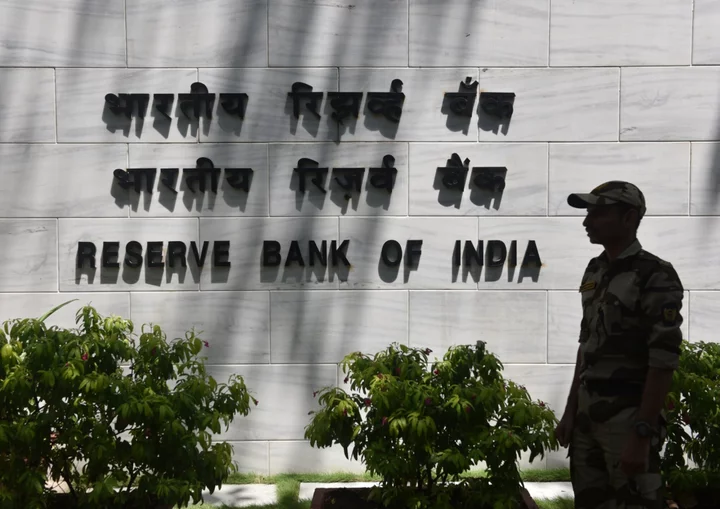
Meta strikes deal to sell VR headset in China - WSJ
(Reuters) -Meta Platforms has struck a deal with Tencent Holdings to sell a new, lower-priced version of its virtual-reality (VR)
2023-11-10 12:00

Cheap Coal Hampers Green Shift in Emerging World, Says Macquarie
Cheap fossil fuels are holding up developing nations’ efforts to move toward green alternatives, highlighting the need to
2023-11-10 11:23

NEF Latest: Carney, Macquarie’s Wikramanayake on COP28 Chances
The prospects for the COP28 climate summit starting at the end of this month are front and center
2023-11-10 10:26

Rupee Green Bond Sale in India to Test Demand Amid Higher Rates
India is set to kick off a second batch of sovereign green bond sales in a test of
2023-11-10 09:29

Wearable 'Ai Pin' launched by Humane, backed by ex-Apple execs and Microsoft
By Stephen Nellis Humane, a Silicon Valley startup with a star-studded list of co-founders and executives, on Thursday
2023-11-10 09:24

Crypto investment fraud warning issued by major bank
A major bank has issued a warning about crypto investment scams, with victims standing to lose more than £10,000 on average and young adults often being particularly at risk. Lloyds Bank has recorded a 23% rise in reports of cryptocurrency investment scams by customers in its banking group (including Lloyds Bank, Halifax and Bank of Scotland) between January and September 2023, compared with the equivalent period last year. Victims are losing £10,741 on average, up from £7,010 last year, the bank said, with many of the scams it analysed originating on social media. The most common age range for crypto scam victims is 25 to 34 years old, Lloyds said. Would-be crypto investors typically make an average of three payments before they realise they have been scammed, taking around 100 days from the date of the first transaction before they report it to their bank, Lloyds added. Crypto is a highly risky asset class and remains largely unregulated, which makes it an attractive area for fraudsters to exploit Liz Ziegler, Lloyds Bank Fraudsters often pose as investment managers, promising that any payments made by the victim will be invested on their behalf, often with the promise of huge returns. Sometimes the victim will be shown a fake investment account, suggesting that the funds are already making a profit, or a small amount of money will be transferred back into their bank account. But often there is no genuine crypto holding and the fraudster will disappear. In some cases, there will be an actual investment account held in the victim’s own name and registered with a legitimate platform. But once funds have been deposited, victims may be tricked into handing over their account login details, or passing control of their digital wallet over to the fraudster. They might also be directed to transfer cryptocurrency from within their own account to another digital wallet, which is under the control of criminals. Liz Ziegler, fraud prevention director at Lloyds Bank, said: “Crypto is a highly risky asset class and remains largely unregulated, which makes it an attractive area for fraudsters to exploit. If something goes wrong, you’re unlikely to get your money back.” Here are Lloyds’ tips for protecting yourself from crypto fraudsters: – Criminals often put adverts for scam crypto investments on social media. They can also send offers by direct message. They will promise returns that you cannot get elsewhere or make claims about “guaranteed” profits. If you are contacted out of the blue about an investment, it is likely a scam. – Fraudsters can easily set up fake companies, social media profiles and websites to clone real firms. Use the Financial Conduct Authority (FCA) website to find genuine contact details for a company and check for warnings about fake firms. Always do your own research or seek professional financial advice. – Never share the log in details for your investment account or your private cryptocurrency keys with anyone else. A legitimate firm would never ask you for this. Remember, if you transfer funds to another account that is not in your name, you have lost control of your money. – Fraudsters may ask you to pay an account in a different name to the company you are meant to invest with. If the names do not match, it is a sign of a scam. Paying by card (rather than a bank transfer) may offer you more protection if something goes wrong. Read More Council investigating extent of cyber attack that affected website and systems Setback for Ireland as EU legal adviser recommends revisit of Apple tax case Smartphones ‘may be able to detect how drunk a person is with 98% accuracy’ Ireland and Apple await major development in long-running EU tax dispute Guidance urges parents not to buy smartphones for primary school children William ‘blown away’ by futuristic technology from Singapore start-ups
2023-11-10 08:28

Google wants AI chatbot Bard to help it reach billions of users
By Jeffrey Dastin NEW YORK (Reuters) -Google's experimental chatbot Bard is a path to developing another product with two billion
2023-11-10 07:51

Netflix, Warner Bros partner with Verizon to offer discounted streaming bundle - source
(Reuters) -Verizon is planning to offer the ad-supported versions of Netflix and Warner Bros Discovery's Max streaming services for about
2023-11-10 07:47

Apple agrees to $25 million settlement with US over hiring of immigrants
By Daniel Wiessner Apple Inc will pay $25 million to settle claims by the U.S. Department of Justice
2023-11-10 07:29

Sony PlayStation 5 Slim Review
As a video game console ages, it's not unusual for its manufacturer to replace it
2023-11-10 07:23

Alaska Judge Sides With ConocoPhillips on New $7.5 Billion Oil Project
A federal judge upheld the Biden administration’s approval of ConocoPhillips’ 600-million-barrel Willow oil development in Alaska, a blow
2023-11-10 07:20

Generative AI still mostly experimental, say executives
By Katie Paul NEW YORK One year after the debut of ChatGPT created a global sensation, leaders of
2023-11-10 06:51
